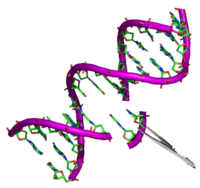
Fish short-term reproduction assay with atrazine and the Japanese medaka (Oryzias latipes).
Sign Up to like & getrecommendations! Published in 2017 at "Environmental toxicology and chemistry"
DOI: 10.1002/etc.3769
Abstract: Breeding groups of Japanese medaka (Oryzias latipes) were exposed to atrazine at measured concentrations of 0.6, 5.5, and 53 μg/L for 35 d. Evaluated endpoints included survival, fecundity, fertility, growth (weight and length), behavior, secondary sex… read more here.
Keywords: oryzias latipes; reproduction; medaka; exposure ... See more keywords

Effects of triclosan on Japanese medaka (Oryzias latipes) during embryo development, early life stage and reproduction
Sign Up to like & getrecommendations! Published in 2018 at "Journal of Applied Toxicology"
DOI: 10.1002/jat.3561
Abstract: Triclosan has been shown to have endocrine‐disrupting effects in aquatic organisms. In 2016, the US Food and Drug Administration banned the use of triclosan in consumer soaps. Before the ban, triclosan was reported at low… read more here.
Keywords: reproduction; early life; life stage; stage ... See more keywords

Effect of thyroid hormone‐disrupting chemicals on swim bladder inflation and thyroid hormone‐related gene expression in Japanese medaka and zebrafish
Sign Up to like & getrecommendations! Published in 2022 at "Journal of Applied Toxicology"
DOI: 10.1002/jat.4302
Abstract: We compared the influence of thyroid hormone‐disrupting chemicals (heptafluorobutanoic acid, PFBA and tris[1,3‐dichloro‐2‐propyl] phosphate, TDCPP) and thyroid hormone (3,3′,5‐triiodo‐L‐thyronine, T3) on swim bladder inflation and thyroid hormone‐related gene expression in Japanese medaka and zebrafish. The… read more here.
Keywords: bladder inflation; hormone; swim bladder; thyroid hormone ... See more keywords

Histopathological evaluation of the interrenal gland (adrenal homolog) of Japanese medaka (Oryzias latipes) exposed to graphene oxide
Sign Up to like & getrecommendations! Published in 2022 at "Environmental Toxicology"
DOI: 10.1002/tox.23610
Abstract: Due to unique physicochemical properties and wide industrial and biomedical applications, graphene oxide (GO) is ubiquitous in the aquatic ecosystem. Using Japanese medaka (Oryzias latipes) fish as a model, we previously demonstrated minimal endocrine disrupting… read more here.
Keywords: oryzias latipes; medaka; japanese medaka; medaka oryzias ... See more keywords

Molecular signaling pathways elicited by 17α-ethinylestradiol in Japanese medaka male larvae undergoing gonadal differentiation.
Sign Up to like & getrecommendations! Published in 2019 at "Aquatic toxicology"
DOI: 10.1016/j.aquatox.2019.01.013
Abstract: Estrogenic contaminants released into water bodies are potentially affecting the reproduction of aquatic organisms. Exposure to 17α-ethinylestradiol (EE2), a synthetic estrogen agonist commonly found in sewage effluents, has been shown to cause gonadal changes in… read more here.
Keywords: signaling pathways; gonadal changes; differentiation; gonadal differentiation ... See more keywords

Quantifying the vector effects of polyethylene microplastics on the accumulation of anthracene to Japanese medaka (Oryzias latipes).
Sign Up to like & getrecommendations! Published in 2020 at "Aquatic toxicology"
DOI: 10.1016/j.aquatox.2020.105643
Abstract: To better assess the risk of microplastics (MPs) as a vector for contaminants, it is essential to understand the relative importance of MPs compared to other pathways for chemical transfer as well as the consequences… read more here.
Keywords: oryzias latipes; vector; quantifying vector; medaka ... See more keywords

Toxicity of oil sands acid-extractable organic fractions to freshwater fish: Pimephales promelas (fathead minnow) and Oryzias latipes (Japanese medaka).
Sign Up to like & getrecommendations! Published in 2017 at "Chemosphere"
DOI: 10.1016/j.chemosphere.2016.12.059
Abstract: The Alberta oil sands are one of the largest global petroleum deposits and, due to non-release practices for oil sands process-affected waters, produced tailings are stored in large ponds. The acid extractable organic (AEO) compounds… read more here.
Keywords: oil sands; acid extractable; toxicity; fathead minnow ... See more keywords

3-(4-Methylbenzylidene) camphor induced reproduction toxicity and antiandrogenicity in Japanese medaka (Oryzias latipes).
Sign Up to like & getrecommendations! Published in 2020 at "Chemosphere"
DOI: 10.1016/j.chemosphere.2020.126224
Abstract: To assess the toxic effects of 3-(4-Methylbenzylidene) camphor (4-MBC) at environmentally relevant concentrations on the reproduction and development of Japanese medaka (Oryzias latipes), adult paired medaka (F0) were exposed to 5, 50, and 500 μg/L 4-MBC… read more here.
Keywords: oryzias latipes; methylbenzylidene camphor; 500 mbc; mbc ... See more keywords

Assessment of reproductive and developmental effects of graphene oxide on Japanese medaka (Oryzias latipes).
Sign Up to like & getrecommendations! Published in 2020 at "Chemosphere"
DOI: 10.1016/j.chemosphere.2020.127221
Abstract: Due to its unique properties, graphene oxide (GO) has potential for biomedical and electronic applications, however environmental contamination including aquatic ecosystem is inevitable. Moreover, potential risks of GO in aquatic life are inadequately explored. Present… read more here.
Keywords: graphene oxide; oryzias latipes; histopathology; medaka oryzias ... See more keywords

Characterization and expression analysis of tandemly-replicated asc genes in the Japanese medaka, Oryzias latipes.
Sign Up to like & getrecommendations! Published in 2020 at "Developmental and comparative immunology"
DOI: 10.1016/j.dci.2020.103894
Abstract: ASC is a component of the inflammasome playing crucial roles in the inflammatory response. In mammals, ASC induces pyroptosis and inflammatory cytokine production. In this study, three asc genes (asc1, asc2, and asc3) from the… read more here.
Keywords: oryzias latipes; asc genes; expression; medaka oryzias ... See more keywords

Production of a tributyltin-binding protein 2 knockout mutant strain of Japanese medaka, Oryzias latipes.
Sign Up to like & getrecommendations! Published in 2020 at "Marine pollution bulletin"
DOI: 10.1016/j.marpolbul.2020.111601
Abstract: Tributyltin-binding proteins (TBT-bps), members of the lipocalin family, bind TBT in fish blood and are presumed to contribute to detoxification of TBT. Recent studies have shown that many fish species have TBT-bp genes, and that… read more here.
Keywords: bp2; strain japanese; tributyltin binding; medaka oryzias ... See more keywords